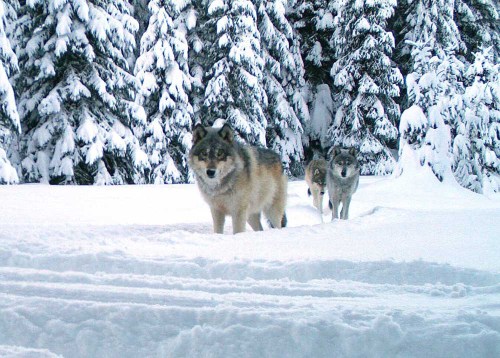Ranchers on wolf ruling: ‘We’re hung out to dry’
Published 6:00 am Thursday, February 17, 2022

- The Oregon Department of Fish and Wildlife on Tuesday, April 19, 2022, released its annual wolf report and found 175 wolves lived in the state in 2021, just two more than in 2020.
SALEM — A federal judge’s decision to renew endangered species protections for some gray wolves in the Lower 48 states is drawing criticism from Oregon ranchers who say they feel defenseless to protect their livestock from chronic attacks.
Environmental groups sued the U.S. Fish and Wildlife Service and former Interior Secretary David Bernhardt after the Trump administration removed wolves from the endangered species list in 2020, arguing the delisting was premature.
Trending
U.S. District Judge Jeffrey White ruled in favor of the plaintiffs on Feb. 10.
“Restoring federal protections means that these vitally important animals will receive the necessary support to recover and thrive in the years ahead,” said Jamie Rappaport Clark, president and CEO at Defenders of Wildlife, one of six groups that filed the lawsuit.
Oregon’s minimum wolf population was 173 at the end of 2020. An updated estimate from the state Department of Fish and Wildlife is expected later this spring.
The Oregon Cattlemen’s Association, which represents ranchers statewide, released a statement blasting the ruling.
OCA President Todd Nash said while environmental groups such as Defenders of Wildlife and the Center for Biological Diversity have seats at the table for developing Oregon’s Wolf Conservation and Management Plan, “they are never satisfied with the brokered compromises.”
Gray wolves were reintroduced in Central Idaho and Yellowstone National Park in the mid-1990s, and since then the species has expanded both in population and geographical area beyond expectations, Nash said.
Trending
“This decision to re-list beyond that experimental area builds mistrust in our legal system and compromises the integrity of the Endangered Species Act,” Nash said.
The ruling does not cover wolves in Eastern Oregon, where the majority of packs are. State wildlife officials will continue to manage wolves east of highways 395, 78 and 95.
Wolves in the western two-thirds of Oregon, however, will be returned to the federal ESA — including the Rogue pack, which was responsible for more than half of all confirmed wolf attacks on livestock in 2020.
Veril Nelson, a cattle rancher in Oakland and co-chair of the OCA Wolf Committee, said producers are frustrated by the about-face in wolf management.
“The bottom line is, we’re hung out to dry,” Nelson said. “Our options are very few.”
Upon delisting, wolves in Western Oregon were placed under Phase I of the state wolf plan, which allows for killing wolves in defense of livestock in limited circumstances.
Wolves could be killed if caught in the act of chasing or biting livestock, or if a pack incurred four “qualifying” depredations in a six-month period. To qualify, ranchers must be using some kind of non-lethal deterrents — such as range riders — and remove all carcasses or bone piles that might attract wolves.
With federal protections back in place, those options are now off the table, Nelson said, adding that non-lethal tools are not 100% effective and costly to maintain.
“How many range riders do you need to cover 40,000 acres? It’s not doable,” he said. “You can be out there and do the best you can, but all of those things cost money.”
OCA is supporting House Bill 4127 in the Legislature that would provide an additional $1 million for the state’s wolf compensation fund to reimburse ranchers for dead and missing livestock, as well as non-lethal prevention. A public hearing for the bill was held Feb. 9.
Jonathan Sandau, a special assistant to the director at the Oregon Department of Agriculture, said the wolf compensation fund has annually received on average $425,000 in requests from ranchers, while paying out just $185,000.
Critics argued the wolf compensation fund is prone to misuse, and increasing funding may encourage ranchers not to look for missing animals but instead default to blaming wolves.









